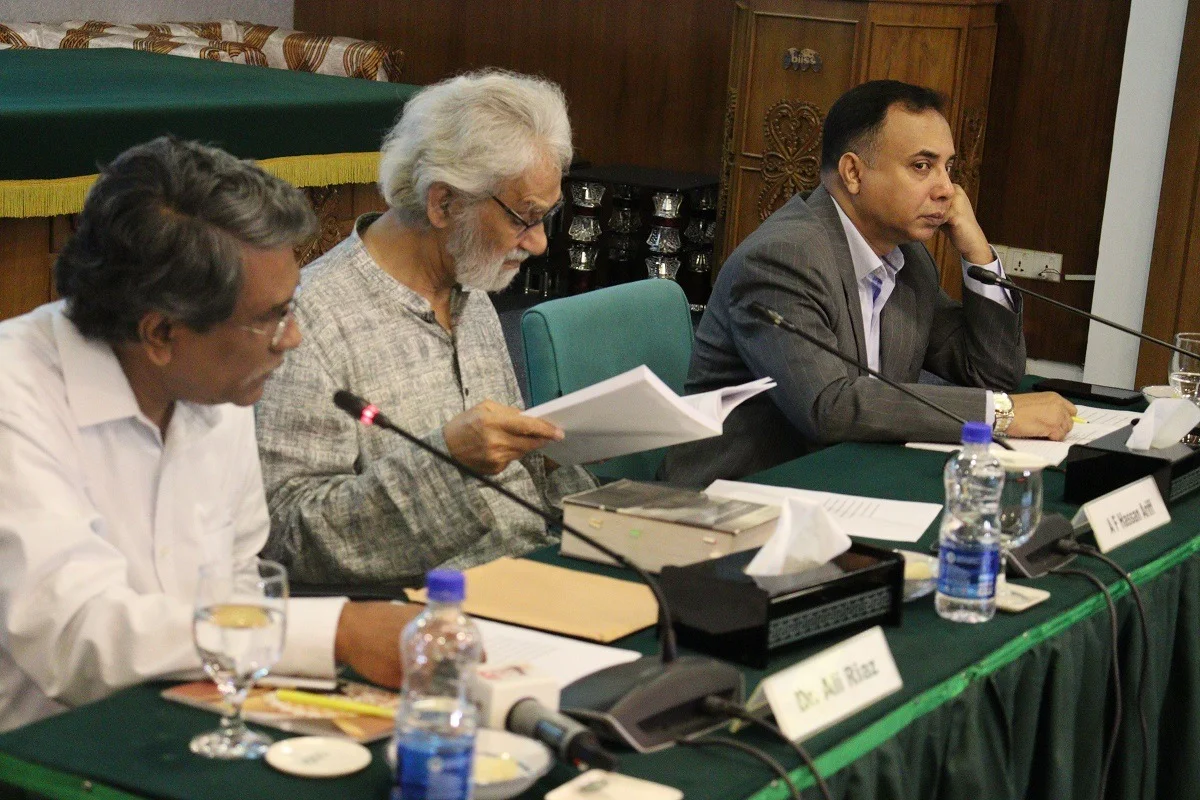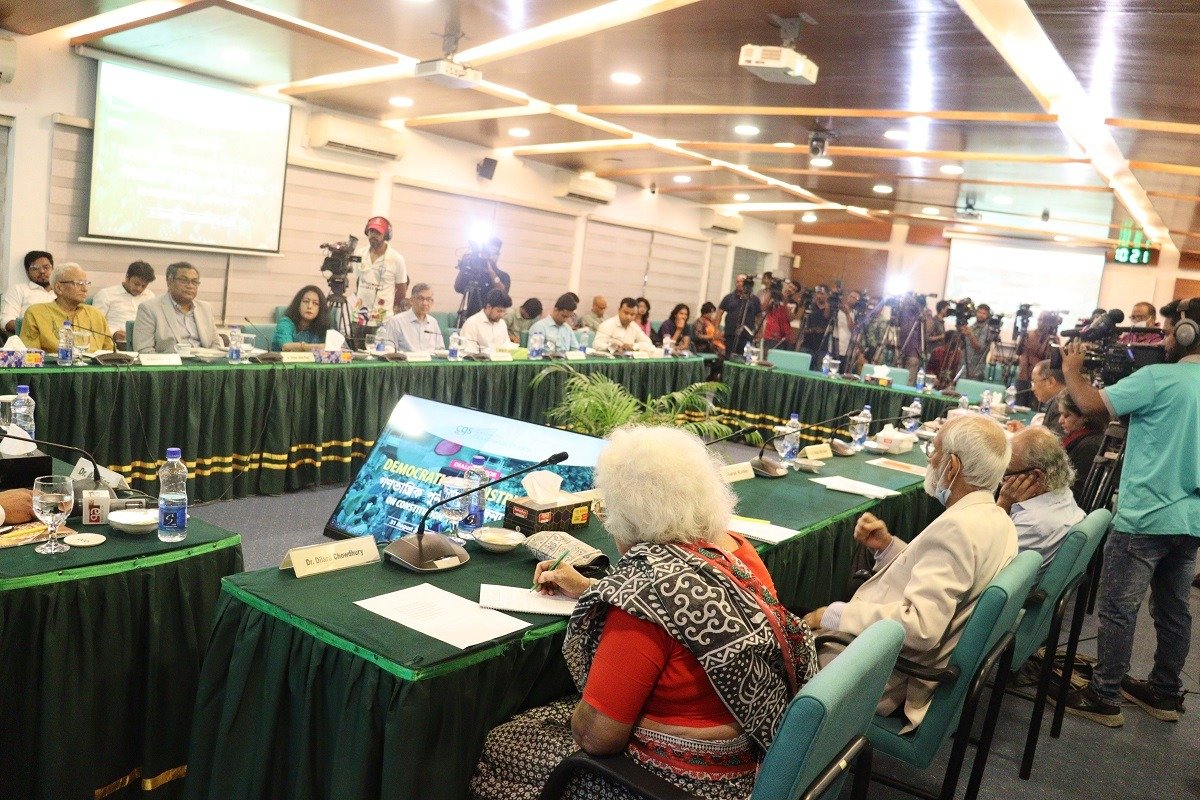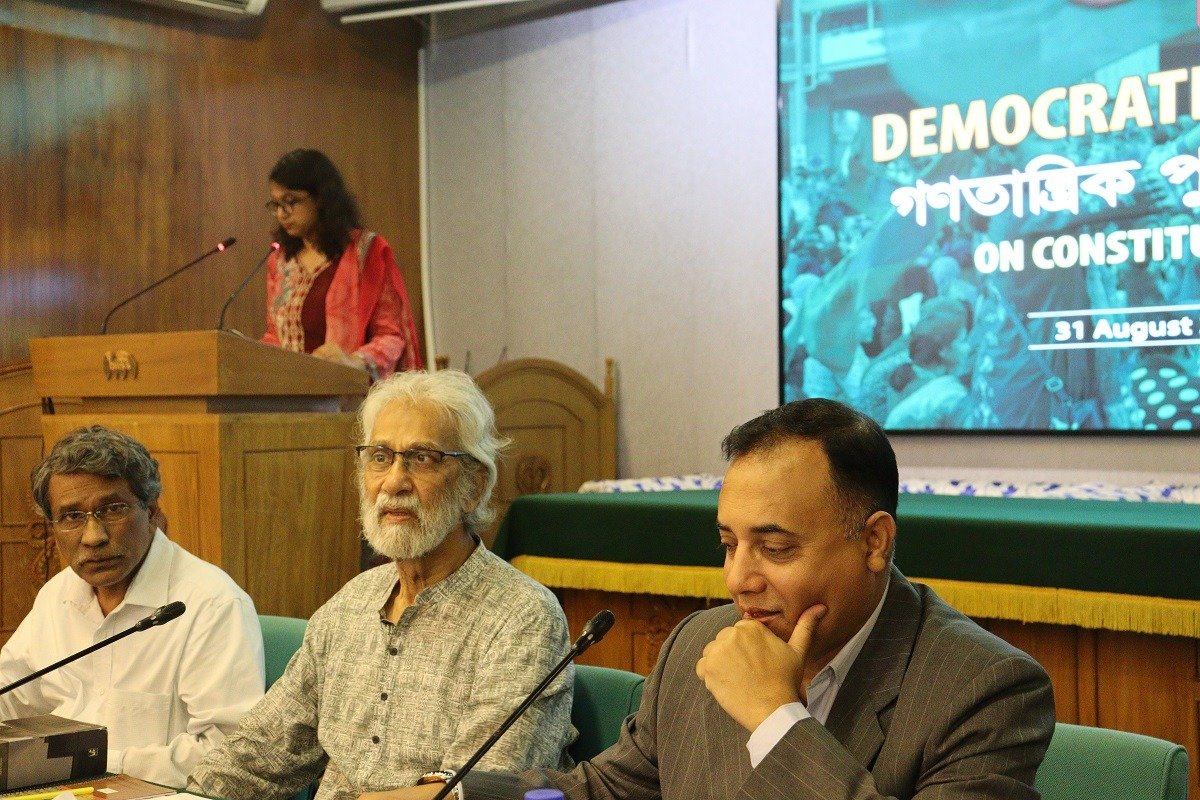Constitutional Amendment or Repeal: Which Path Will Lead to Democratic Reconstruction?
Share on:

The Centre for Governance Studies (CGS) hosted a dialogue session to discuss the constitutional reform for the interim government on Saturday, 31st August 2024, at the Bangladesh Institute of International and Strategic Studies (BIISS) Auditorium.
Speakers included Dr. Ali Riaz, Distinguished Professor of Illinois State University, USA, and member of CGS’s Advisory Board, Dr. Badiul Alam Majumdar, Secretary of SHUJAN, Ikteder Ahmed, Former Judge and Columnist, Nurul Kabir, Editor of New Age, A F Hassan Ariff, Advisor, Ministry of Local Government, Rural Development and Cooperatives and the Ministry of Land, Dr. Borhan Uddin Khan, Professor, Department of Law, University of Dhaka, Barrister Sara Hossain, Senior Advocate, Supreme Court of Bangladesh, Dr. Manzoor Hasan OBE, Executive Director, Centre for Peace and Justice, BRAC University, A.M. Mahbub Uddin Khokon, President, Bangladesh Supreme Court Bar Association, Mahfuj Alam, Special Assistant to the Chief Advisor, Habibur Rahman, Former Student, Department at Law, University of Dhaka, Z I Khan Panna, Advocate, Supreme Court of Bangladesh and Chairperson of Ain o Salish Kendra, Barrister Raja Devasish Roy, Chief of Chakma Circle, Dr. Dilara Chowdhury, Professor, Department of Political Science, Jahangirnagar University, and Dilruba Shormin, Advocate, Supreme Court of Bangladesh, Munira Khan, President FEMA.
Zillur Rahman, Executive Director of CGS, moderated the discussion.

Zillur Rahman initiated the dialogue by stating that for many years, the people of Bangladesh have harboured the unfulfilled dream of establishing a democratic nation. Instead, the past 15 years have seen Bangladesh under a dictatorship marked by enforced disappearances and a complete absence of freedom of speech. After significant sacrifices, students who confronted discrimination and sparked a mass uprising successfully removed the autocratic regime. Now, Dr. Yunus, head of the interim government, has extended an invitation for a dialogue on reforms. In response, CGS will organise a series of discussions both in Dhaka and beyond, culminating in a policy paper. This series will consist of eight dialogues, with the first focusing on the Constitution. For reform to be sustainable, it must reflect the true spirit of our liberation war, which has often been more aspirational than actualised. Today, we have gathered distinguished experts in constitutional law to help guide our discussion, which will be centered around seven key questions.

Dr. Ali Riaz stated that the core question is whether the current Constitution can truly support a democratic society. Over the past 15 years, we’ve witnessed an autocratic regime that the Constitution has effectively sustained. I believe significant reforms are necessary to achieve genuine democratic change. The concentration of power in the prime minister’s office is a major concern, with the PM holding both executive and presidential authority. The current regime operated entirely within the Constitution, meaning that future leaders will inherit the same extensive powers.
A critical issue is the independence of the judiciary. The process for appointing members to constitutional bodies lacks transparency and must include open hearings. The most glaring example was the prime minister’s sole appointment of the president. Similarly, the appointment of the election commission has been opaque, allowing the government to install its own appointees and conduct elections on its own terms.
We also need mechanisms to prevent the tyranny of the majority in parliament, potentially through proportional representation or a bicameral system. The freedom of expression has been curtailed, as CGS has documented over the past four years with the misuse of the DSA and CSA. Given the structure of the current Constitution, even a party winning a majority of 300 seats cannot amend it. Therefore, in my view, the Constitution needs to be completely rewritten.
Hassan Ariff stated that the Constitution serves as a vehicle for democratic reform. Since the aspirations of 1971 remain unfulfilled, the mass uprising of 2024 has brought forth the need for change. For this reason, we should consider establishing a second republic while preserving the essence of the first. Insights from constitutional debates in other countries can guide us. A continuously amended constitution does not hinder democratic progress; rather, it remains a dynamic document. Our primary focus should be on democratic reconstruction, incorporating diverse perspectives to rebuild democracy effectively.
Dr. Badiul Alam Majumdar stated that The interim government must clarify whether it intends to reform or completely rewrite the Constitution. Once this decision is made, we can offer our recommendations. Clauses in the Constitution that render one-third of the Constitution untouchable do not constitute the basic structure and can be revised or removed. Restoring the power of referendums could address many constitutional issues. We understand that the government plans to engage with political parties soon and wish them success in these discussions. It is crucial for the government to establish a clear roadmap for the nation’s repair and reconstruction.
Nurul Kabir stated that For a democracy, the roles of drafting and amending the Constitution should be distinct. The sovereignty rests with the people, not with the parliament. The requirements for a constitution are rooted in history, dating back to 1971. A constitution essentially serves as the state’s biography. The current Constitution has several shortcomings and must reflect the will of the people. This will must be clearly represented in the Constitution. The parliament’s role is to amend the Constitution according to its established rules, not to draft a new one. As long as the prime minister holds excessive power, the judiciary will remain ineffective. All institutions have limited powers; only the people should have limitless authority.
Dr. Borhan Uddin Khan remarked that the Constitution has become effectively criminalised and overly rigid, with one-third of it immune to amendment. From his perspective, the Constitution is undermining our historical legacy. The Proclamation of Independence, once a part of our interim Constitution, is a critical historical fact that cannot be erased. Even if the court were to invalidate some amendments, the parliament must still address the need for new amendments. However, even a new parliament with a two-thirds majority would face challenges in making necessary changes. The Constitution has strayed from the spirit of 1971, with the prime minister wielding excessive power. Therefore, Dr. Khan advocates for establishing a new republic with a new constitution.
Barrister Sara Hossain emphasised the need for diverse perspectives in the ongoing discussion. There must be more scrutiny of the argument that the Constitution should be entirely rewritten. While dismantling existing structures may seem straightforward, creating something new is far more challenging. For any new framework to be sustainable, it must be inclusive. It is not enough to create something that is merely permanent; it must also be adaptable and capable of ongoing improvement. The current dialogue seems to focus primarily on freedom of expression, neglecting other fundamental rights. Additionally, we still retain the death penalty. In considering reform, we must examine both societal norms and practices, not just the functions of institutions.
Manzoor Hasan OBE stated that the 1972 Constitution was once a progressive document. While some view constitutions as immutable, this is not the case. Over the past 50 years, the Constitution has been distorted into an ineffective form, undermining the will of the people in favor of a small group of politicians. It may be impossible to amend it back to its original intent. The only way to truly reflect the people’s will is by drafting a new constitution through a fresh constitutional assembly. Although this may seem challenging, a consultative and inclusive process can help us navigate many obstacles. Creating something new doesn’t mean starting from scratch; we can build on our existing experiences. This approach will benefit not only our institutions but also future generations by establishing a clear path for good governance. We need a new constitution to ensure effective governance, the rule of law, and political integrity.
A.M. Mahbub Uddin Khokon noted that time is running out for action. After the initial period of opportunity, it may become challenging to implement changes. He expressed concerns about the legal foundation for constitutional reform. Although students played a crucial role in toppling the autocratic government, their demands were primarily focused on quota reform. The sustainability of any reform is questionable. While there is widespread support for reform, those in power often disregard legal considerations. Many people still lack the benefits of democracy and the rule of law due to poverty and economic inequality. To achieve meaningful reform, it may be necessary to address the legitimacy of previous parliaments.
Mahfuj Alam emphasised that the will of the people must be central to any constitutional changes. A constitutional assembly should embody the people’s ideology. The original Constitution was shaped by Mujibism, and it’s crucial that future political parties undergo reform to better reflect their ideologies, as these were not fully represented in the movement that led to Bangladesh’s liberation. We need to engage directly with the people to understand their current needs and aspirations. There is a notable shift in public will from 1972 to 2024, and it is important to identify a continuous thread connecting these periods. The new Bangladesh should honour the sacrifices that led to the fall of a dictator. If the Constitution is to be reformed, it must incorporate the will of the people from 1971, the Proclamation of Independence, and the current will of the people in 2024. Only by integrating these elements can the new Constitution truly be democratic. The previous government has undermined all institutions, which now need to be rebuilt. The new Constitution should facilitate the democratic reconstruction of the state.
Habibur Rahman stated that the central issue at hand is whether to pursue a constitutional amendment or to draft an entirely new constitution. One might question if the current interim government even derives its legitimacy from the Constitution, given its indefinite tenure. While this administration might come to resemble the 1/11 government after 90 days, it differs in that its mandate stems not from the Constitution but from the mass uprising.
The current Constitution is inflexible and needs to accommodate amendments more effectively. To move beyond its rigid framework, we must consider whether a new constitution is necessary. Creating a new constitution would effectively establish a new republic, which could entail renaming Bangladesh.
Currently, the 13th Amendment is under review, and the 15th Amendment is facing a writ petition. Relying solely on judicial rulings could constrain future generations. Instead, we should pursue constitutional reform through a national convention or by electing a constitutional assembly. In my view, drafting a new constitution should precede holding elections.
Ikteder Ahmed largely concurred with Habibur Rahman, noting that the Supreme Court’s authority is restricted and the judiciary lacks true independence. He emphasised that it is challenging to implement changes while retaining the current Constitution.
Z I Khan Panna remarked that the Constitution reflects the perspective of 1971, and the laws were crafted in response to specific historical contexts. These laws were designed to suppress and oppress, a tendency that originates not from the state or the Constitution itself, but from individuals in power. If bureaucrats can be manipulated, genuine democracy cannot be achieved. While reform is necessary, discarding the existing Constitution entirely is not advisable. Establishing a precedent of replacing constitutions could lead to future disposals of new ones as well.
Raja Devasish Roy emphasised that the initial constituent assembly, followed by the parliament, is crucial in shaping the state’s Constitution, which serves as its blueprint. Without a solid blueprint, we cannot build a strong foundation for the state. True democracy requires proportional representation and the protection of fundamental rights. While indigenous people in the hills have some rights, those in the plains receive none. The current Constitution lacks inclusivity and needs to be revised to address these gaps.
Dr. Dilara Chowdhury noted that there is widespread consensus that the current Constitution is unworkable. The interim government’s legal mandate is notably weak, and the will of the people should take precedence. If a constitutional assembly had been established for the 1972 Constitution, the current issues might have been avoided. Civil society has fallen short in this regard. Creating a new constitution through a constitutional assembly is a lengthy process, as demonstrated by Nepal, which took around eight years and required two assemblies. Given this timeline, it’s uncertain if Bangladesh can afford such a delay. An alternative could be a national convention, which might offer a quicker solution. In this approach, political parties and independent citizen groups could collaborate to provide recommendations for a new constitution.
Dilruba Shormin highlighted that those in the legal profession hold the Constitution in high regard. However, we have observed political parties manipulating the Constitution for their own gain. At this point, rewriting the Constitution seems unavoidable and is timely. The Prime Minister has acquired extraordinary powers under the current framework, which has become nearly incomprehensible. Lawyers frequently face suppression under the threat of constitutional provisions. The Constitution should not be used as a tool for repression.
Munira Khan posed the age-old question of whether the chicken or the egg comes first, reflecting the dilemma faced by the people. The current government has not moved away from the existing Constitution and operates with the mandate of the people’s will, but not within the bounds of the Constitution. Without an election and a new parliament, crafting a new constitution is challenging. The priority should be the will and rights of the people, with goodwill being a crucial factor. The current government is recognised globally, and an election held under their aegis would be widely accepted. The key issue is how representatives will shape their platforms to truly reflect the will of the people.

